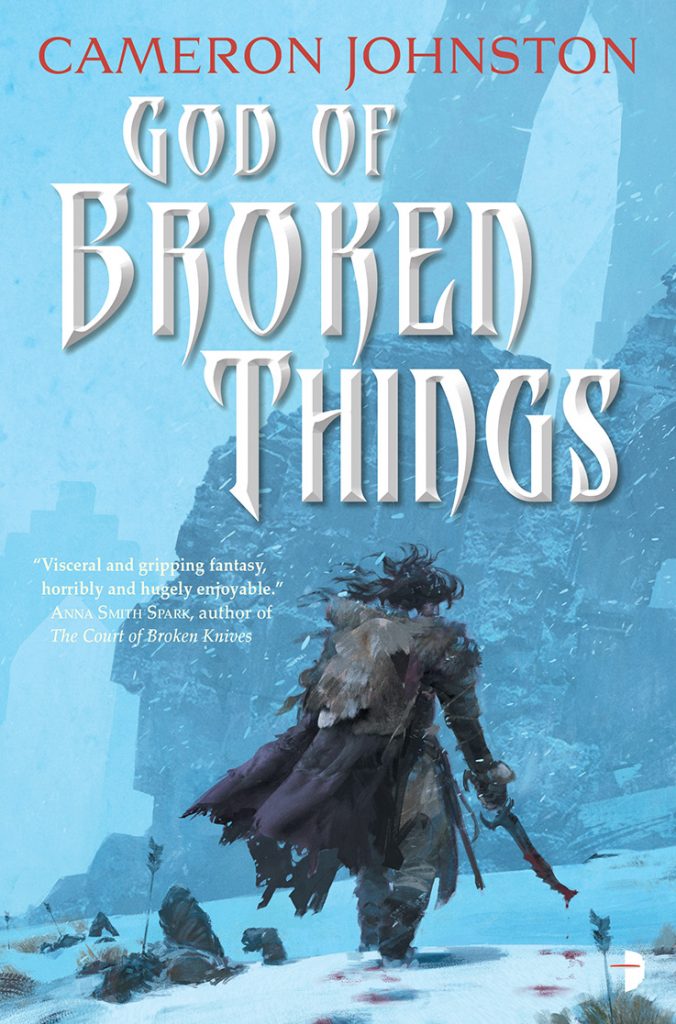God of Broken Things by Cameron Johnston (Book Review)
| An outcast magician must risk his body and mind to save the world from horrifying demons… |
In Cameron Johnston’s first book, The Traitor God, professional survivor and demon dagger enthusiast Edrin Walker was focused purely on finding whoever skinned his best friend alive and killing them in an equally unpleasant manner. His actions were driven by vengeance, self-interest and, in a few cases, a genuine desire to protect his friends, but he never wanted to a hero. In God of Broken Things, Walker really doesn’t get a choice but to be a hero, and this, as you’d expect, rather pisses him off.
 As a “reward” for saving his city in the first book, Edrin Walker is plucked right out of his comfort zone (back rooms and alleys) and shipped leagues away, to a wilderness where his only allies are fellow mages who clearly hate his guts. Better yet, his thankless task is not to win a war or defeat a great evil, but to slow down an army of invading parasite-controlled barbarians long enough for others to win a war. His goal is to make their inevitable victory as painful as possible by temporarily inconveniencing them. With death.
As a “reward” for saving his city in the first book, Edrin Walker is plucked right out of his comfort zone (back rooms and alleys) and shipped leagues away, to a wilderness where his only allies are fellow mages who clearly hate his guts. Better yet, his thankless task is not to win a war or defeat a great evil, but to slow down an army of invading parasite-controlled barbarians long enough for others to win a war. His goal is to make their inevitable victory as painful as possible by temporarily inconveniencing them. With death.
This unwelcome change of pace forces Walker to do two things he isn’t very good at and certainly doesn’t like. First, he must both get along with and actually lead a group of mages who either fear him or want him dead. Second, he must plan an extensive guerilla military operation against an experienced invader with overwhelmingly superior numbers, despite having absolutely f*** all experience in military strategy. And as a final poke in the eye, he must work with the local witches who once tried to murder him (and still hope to do so!) because without their aid, he’ll never slow the army long enough to save his friends.
On the surface, God of Broken Things is a war story, and the ways Johnston leverages his already interesting magic system into the punches and counterpunches of a running magical military battle is one of the most entertaining parts of the book. If there’s one thing Walker’s good at, it’s coming up with nasty tricks and traps to slay his enemies, yet this time, the enemy is just as devious and clever as he is. Worse yet, Walker has traitors within his ranks waiting to backstab him the moment they get the chance. The running battles of the book are a highlight that showcase Johnston’s cool magic system.
However, Johnston’s book is much more than a series of riveting battles and explosions. As Walker’s situation gets more desperate, we gain further insight into the events that shaped him into the dickish yet sympathetic jerk he’s become. We also (finally!) learn the true origin of Walker’s demon dagger and his history with his witchy brethren, and watch him move beyond vengeance to truly caring about people outside of his circle of friends. He grows both as a person and a leader.
By the time the book careens toward its close, the stakes have risen beyond even Walker’s worse fears. The final clash between Walker and the leader of the opposing army is as epic as the flesh kaiju battle from the first book, and just as satisfying. And as is typical for Walker, the choices he makes in the end leave almost everyone incredibly pissed off, which is just the way he’d want it.
To avoid spoilers, I’ll say only that the ending of the book surprised me not once, but twice, and in both cases, the surprise felt both earned and inevitable. With the conclusion of his Age of Tyranny duology, author Cameron Johnston brings the journey of the characters we already know to a satisfying end, introduces new characters who are just as entertaining, and unveils the deeper history of the world he only hinted at in his first book. It’s a great ride for fans of both epic and military fantasy.
If you enjoy bloody, highly tactical magic battles, a slow burn demonic history reveal, and a grumpy and relatable jerk who you can’t help but root for despite his flaws, God of Broken Things is your jam.

[…] T. Eric Bakutis of The Fantasy Hive opines: “On the surface, God of Broken Things is a war story, and the ways Johnston leverages […]